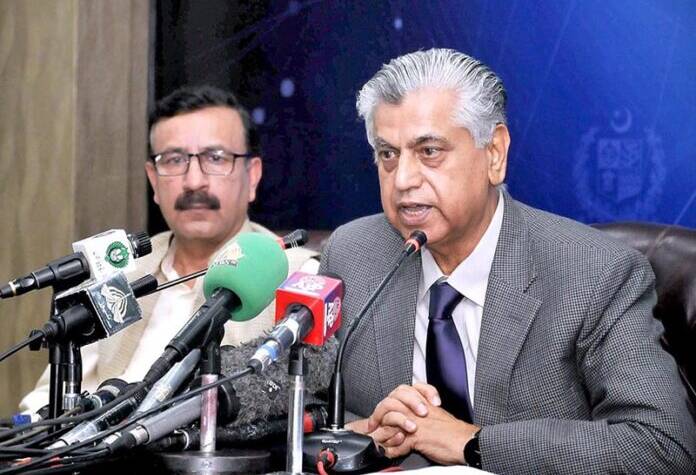CPEC bolsters people-to-people contacts between Pakistan-China: Caretaker Information Minister
Caretaker Minister for Information and Broadcasting, Murtaza Solangi, highlighted the significant impact of the China-Pakistan Economic Corridor (CPEC) on deepening economic cooperation and enhancing people-to-people contacts between Pakistan and China. He noted the increasing number of Pakistani students studying in China and the growing interest in learning the Chinese language. Solangi also emphasized the cultural exchanges, art exhibitions, and shared heritage between the two nations, highlighting the historical significance of the Silk Road in facilitating exchange and cooperation between communities. He mentioned the importance of Buddhism in the region’s history and the role of iconic figures like Xuanzang and Marco Polo. Solangi emphasized the enduring connections between the Gandhara region, India, and the West, dating back to the era of Darius I.
ISLAMABAD: Caretaker Minister for Information and Broadcasting Murtaza Solangi Wednesday said the launch of China-Pakistan Economic Corridor (CPEC) had not only deepened the economic cooperation between the two brotherly countries but also bolstered people-to-people contacts in a remarkable way.
“Over 28,000 Pakistani students were currently studying in China. This aspect of cooperation is of prime importance in the framework of the Belt and Road Initiative,” the minister said while addressing the Art Exhibition & Cultural Show at Pakistan National Council of Arts.
Since the launch of CPEC, he said people-to-people connectivity between Pakistan and China had soared to new heights.
In Pakistan, the minister said the number of Chinese language learners was growing exponentially with the establishment of Confucius institutes in top universities like the University of Punjab, NUML University and others.
Likewise, Pakistani students also visited Chinese universities on Chinese government scholarships to learn Chinese language and do professional degrees/diplomas, he added.
He said similarly artists from Pakistan and China frequently exchanged visits to showcase their artwork in each other’s countries through art exhibitions.
In the Joint Statement of the People’s Republic of China and the Islamic Republic of Pakistan (2022), he said both sides reiterated the importance of people-to-people contacts, tourism cooperation and cultural exchanges for strong bilateral relations.
Building on the MoU on Tourism Exchanges and Cooperation signed in November 2021, Solangi said the two sides agreed to celebrate the Pakistan-China Year of Tourism Exchanges in 2023 and to establish strong linkages between the tourism promotion agencies and private enterprises of the two countries.
The minister said in May 2023, the Pakistan-China joint exhibition at the Palace Museum featured 173 Gandhara artifacts from Pakistani museums, promoting shared heritage and cultural exchange between the two nations, fostering cultural cooperation and offering insights into Pakistan’s heritage for the general public and Chinese scholars.
“These exchanges are not new. In fact, from 138 B.C. until our modern age, the Silk Road has managed to represent one of the longest-established and permanent hubs for exchange, influence, and cooperation between communities,” Solangi remarked.
The Silk Road did not only promote commodity exchange but also culture, he said, while citing Buddhism as one of the religions of the Kushan kingdom that reached China.
“Together with merchant caravans Buddhist monks went from India to Central Asia and China, preaching the new religion,” the minister added.
He said Buddhist monuments were discovered in numerous cities along the Silk Road. During the ancient period, Buddhism flourished in both China and Pakistan.
He noted that the famous Chinese traveler and scholar, Xuanzang, embarked on a journey to the Gandhara region of present-day Pakistan in the 7th century. “In his travels through what is now Pakistan, he recalls the Swat Valley, the famous Bala Hisar Fort which was a fortified royal residence even at the time.”
He said the Caravan routes were often used by scientists and researchers, the most known of whom was the Venetian merchant Marco Polo.
“For centuries, the southern part of the land Silk Roads, wound its way to south from Central Asia, across some of the highest mountains in the world, down through modern Pakistan and then curved east into India (Hindustan) or continued south to the Arabian Sea,” the minister said.
He added that the Taxila route played an essential role throughout the Pakistani region, where cultural activity flourished, most notably with the emergence of Gandhara art.
Both the Gandhara region and Indian sub-continent were able to forge links with the West during the era of Darius I, king of the Persian Achaemenid Empire from 522-486 BC, he said, adding this was due to the fact that an interconnected network of commercial, trading relationships had not previously been established amongst various regions.
Chinese envoy Zhao Shiren urges students to uphold integrity and strengthen China-Pakistan ties
LAHORE:The Consul Generals from several countries and other distinguished guests attended …











